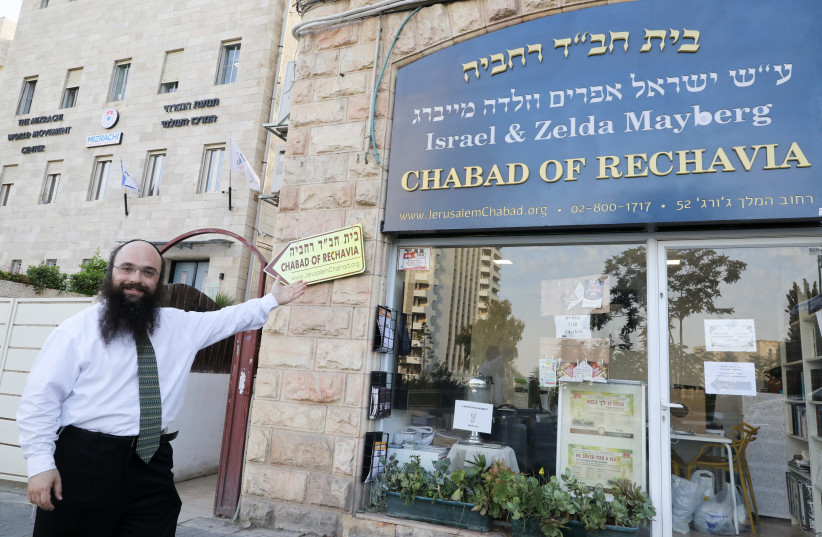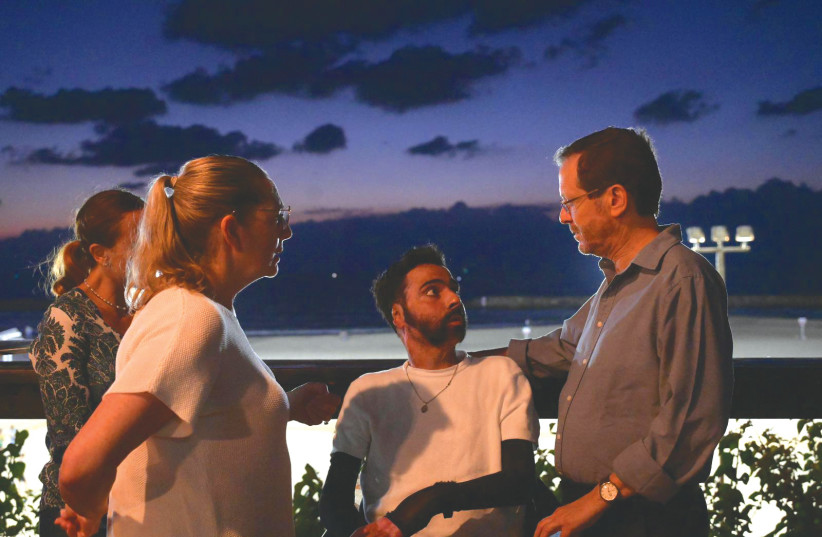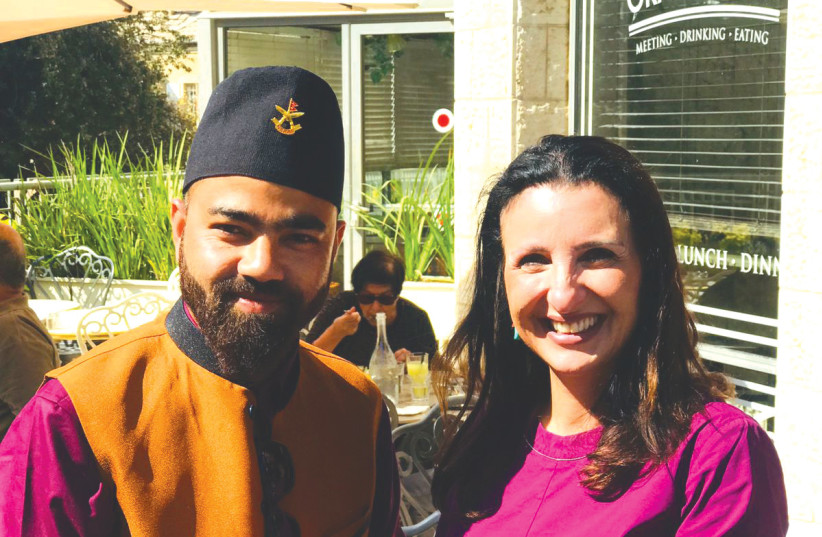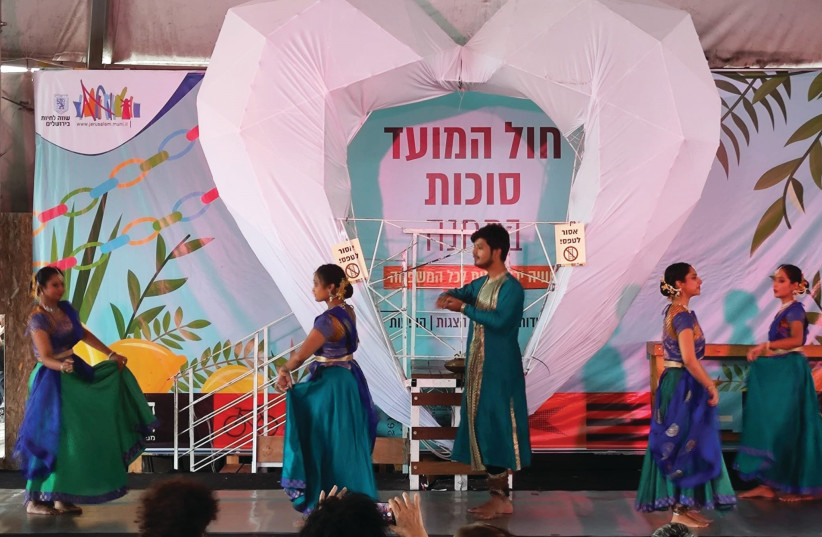One of the beautiful things about the Simhat Torah, especially in religious cities and neighborhoods throughout the country, is to see the number of people in the streets going to or coming from synagogue services. There are even more than one sees on Rosh Hashanah and Yom Kippur – especially in the post-COVID era.
It’s unfortunate that in some places this passing parade is spoiled by the number of children whose indulgent parents have allowed them to come to services on bicycles, scooters, skateboards and roller skates, which, together with the number of baby carriages being wheeled on the sidewalks, makes life somewhat difficult for elderly pedestrians who no longer have the speedy reflexes to quickly get out of the way.
In Jerusalem, between Yemin Moshe and Jaffa Road, with additional synagogues in streets on both the left and the right, there are more than 15 congregations, ranging from ultra-Orthodox to Chabad, Modern Orthodox, Sephardi, Persian, Conservative and Reform.
Elsewhere in the extended area, but still within relatively easy walking distance, are Carlebach, Kurdish, Syrian, and Bukharan congregations, which are a joy to people who are interested in seeing and hearing how their fellow Jews from diverse backgrounds celebrate Shabbat and other Jewish holy days.
On Simhat Torah, when there is a lot of singing and dancing, there is nothing more delightful than a Hassidic congregation, though some people who are not as observant are hesitant to attend any of those synagogues, other than Chabad, which is welcoming and nonjudgmental. Chabad males observe a certain dress code, so it is easy to tell who is and who isn’t a Chabadnik. It’s a little more difficult with the women, except in the case of those women who come in pants, shorts, or miniskirts, and are carrying large backpacks. Some Chabad women have smaller backpacks with a few toys for their children.

Chabad learned long ago that the way to a man’s or a woman’s heart is through the stomach, and most Chabad directors tend to provide a sumptuous kiddush on Shabbat and Jewish holy days. Chabad of Rehavia is no exception, and Rabbi Yisroel Goldberg and his wife, Shoshi, both on Sunday night and Monday morning, put out a spread that included gefilte fish, cold cuts, schnitzels, kugel, salads, pasta, cookies and soft drinks, plus something stronger in the men’s section.
Although there were some people with good table manners, for the most part, it, unfortunately, looked like a scene from Portnoy’s Complaint, with the kind of gluttony and lack of consideration for others that one sees all too often at any kiddush. Rabbis are wary of speaking against it. After all, the worst glutton may be the most generous financial contributor to the synagogue.
The Chabad synagogue in Rehavia is too small to accommodate the High Holy Day and Simhat Torah turnouts and often moves its services to nearby Heichal Shlomo, which was packed, especially on Sunday night, when visitors from other congregations came to get a Hassidic experience.
At hakafot on Monday, the crowd danced out of the building to the cascading fountain in France Square, dancing around it with great enthusiasm. Unfortunately, this is an area that all year round is noted for its jaywalkers. On the way back to Heichal Shlomo, Goldberg, who himself is the father of many children, kept urging parents to take care of their children and to make sure that they didn’t cross the road against the lights. But adults coming toward them did. Although there is no public transportation on Jewish holy days, other motorized transport operates as usual.
Netanyahu refuses to be in photographs with Ben-Gvir
■ DESPITE THEIR political support of each other in a bid to ensure a right-wing government in the aftermath of the upcoming Knesset elections, Likud leader Benjamin Netanyahu has no desire to be photographed with Otzma Yehudit leader Itamar Ben-Gvir, fearing that right-wing moderates may withdraw support for the Likud if it appears that the two are closely intertwined.
When Netanyahu arrived at Kfar Chabad on Monday night for the Second Hakafot, Ben-Gvir was already on stage and was reluctant to step down, even though Chabad organizers tried to dance him off. When it became clear that Netanyahu would not mount the stage while Ben-Gvir continued to be there, Ben-Gvir left in anger. Although he has mellowed somewhat since entering politics and has developed an ever-increasing following, he cannot live down his relationship with the late Rabbi Meir Kahane, whose racist views were abhorred by most Israelis, nor can Ben-Gvir escape the fact that in his home there had been a large photograph displayed of Dr. Baruch Goldstein, a religious extremist, who is 1994 in the Cave of the Patriarchs in Hebron, was the perpetrator of a violent attack on Palestinian Muslim worshipers which resulted in 29 deaths and 125 wounded. Ben-Gvir has removed the photograph, but it continues to haunt his political career.
In the event that Netanyahu does succeed in forming the next government, Ben-Gvir is likely to be appointed a minister in return for his party joining the coalition. Netanyahu will then have no choice about being photographed with him when the new government is presented to President Isaac Herzog. But then, at least it will be a group shot unless Ben-Gvir deliberately positions himself alongside or directly behind Netanyahu so that a photo of the two of them can be cropped out of the group.
Breaking down barriers
■ SOME AMBASSADORS continue to take an abiding interest in the countries and regions in which they have served, but rarely with the intensity of former US ambassadors Dan Shapiro and David Friedman, although they stand on the two sides of the political divide; and, presumably, current US Ambassador Tom Nides will follow suit.
It may have something to do with the fact that all three are Jewish – but not necessarily so. All three have been involved, in one way or another, in breaking down barriers between Israel and its Arab neighbors, because they sincerely believe that it will be good for both sides and that it will bring a degree of stability to the region.
However, Friedman is not in accord with Shapiro and Nides over the Israel-Lebanon gas deal. While Shapiro and Nides are enthused over it, Friedman says that Israel’s concessions to Lebanon indicate that Israel is willing to overpay for protection.
While both sides had reservations during negotiations, US mediator Amos Hochstein was able to charm both sides into an agreement that he believes will be mutually beneficial.
That Hochstein was born in Jerusalem to American immigrant parents, grew up in Israel’s capital, was a member of Bnei Akiva and served in the Armored Corps, before making his way to Washington, could not have escaped the attention of Lebanon’s intelligence services. And yet the Lebanese were willing to negotiate with Hochstein and even to socialize with him, because they found him to be extremely charismatic, casual and likable. That he is now part of the US establishment on Capitol Hill does not negate his origins or whatever loyalty he still has toward Israel. And yet the Lebanese accepted him as an honest broker. That’s something worth thinking about.
Yamtov to help IDF veterans who experience physical and psychological trauma
■ DESPERATE SITUATIONS often require desperate measures. Itzik Saidian, a veteran of Operation Protective Edge, the 2014 war in Gaza, who suffers from post-traumatic stress disorder, for which he believed he and others were not being properly treated, and in 2021 set fire to himself on the eve of Remembrance Day, in what may have been a suicide bid. He was taken in critical condition to Sheba Medical Center, Tel Hashomer, where he underwent a long and painful rehabilitation process. His whole body was covered in severe burns, so much so that he was placed in a medically induced coma for almost six months. He regained consciousness in September last year but did not make a public appearance till many months later.

His act of desperation shocked then-prime minister Netanyahu and Defense Minister Benny Gantz, who each promised investigation and reforms. Since then, there have been significant improvements in the treatment of veterans with PTSD.
On Friday of last week, Saidian was visited in the hospital by Herzog and his wife, Michal, accompanied by members of Yamtov, established in 2017 to help in the rehabilitation of IDF veterans who experienced physical and psychological trauma during their service. Yamtov promotes belief in the power of the sea, surf and sails to form connections within the group and also works with each veteran individually. It is managed by sailing professionals, rehabilitation experts and volunteer entrepreneurs.
In a very frank discussion, Saidian said that he was interested in Yamtov, but that in addition, he wanted to start some kind of social activist movement on behalf of IDF veterans with physical and/or mental disabilities.
The president told him that he had already displayed the leadership potential for which history had tested him. “It’s a pity that you paid so very high a price,” Herzog told Saidian, adding that he had been a fine example of leadership.
In praising the Yamtov initiative, the president noted that the Bible has many references to the power of the sea.
On Wednesday, October 19, Herzog will host the Israel Cancer Association, a traditional event hosted annually by the presidents of Israel. This year is a special year in that the Association is marking its 70th anniversary, but Herzog has a more personal reason than simply honoring the ICA on its milestone anniversary. His late aunt Suzy Eban, who was the older sister of his mother, Aura, was in 1952 the founder of the association, officially becoming its president in 1959, and remaining in that position until her retirement in 1998.
What happened during the annual Feast of Tabernacles
■ AT INTERNATIONAL conferences and other large-scale international gatherings, some countries are represented by large numbers of delegates, while others have only one. That’s what happened during the annual Feast of Tabernacles hosted by the International Christian Embassy in Jerusalem, at which Prakash Bish was the sole representative from Nepal, among approximately 2,000 participants.

Bish sits on the City Council of Dakshinkali, which is part of greater Kathmandu and holds the portfolio for Welfare, Health and Education. He was previously a television presenter and the anchor for Junata TV. During his stay in Israel, he met with Jerusalem Deputy Mayor Fleur Hassan-Nahoum.
Preelection conferences in Israeli newspapers
■ AS MENTIONED previously in this column, daily newspapers in Israel are hosting preelection conferences with leading political figures in order to enable the public to make more informed choices with regard to their voting for the Knesset. But newspapers are not alone in organizing such events.
The Manufacturers Association is on Wednesday hosting a members-only political leaders conference featuring Bezalel Smotrich, Religious Zionist Party; Netanyahu, the Likud; Gantz, National Unity Party; Merav Michaeli, Labor Party; Ahmad Tibi, Ta’al; Zehava Gal-On, Meretz; Moshe Gafni, United Torah Judaism; and Ayelet Shaked, Bayit Yehudi. The general public can view the conference, which will be broadcast live from 11 a.m., on the association’s Facebook page.
Tel Aviv International Salon to host Gantz and will be moderated by Yaakov Katz
■ IN ITS English language preelection series for young professionals in their 20s and 30s, the Tel Aviv International Salon will, on October 24, host Gantz, chairman of the National Unity Party. The event, which is free of charge, will be held at ZOA House, 1 Daniel Frisch Street, Tel Aviv, from 6:30 p.m. It will include refreshments, the opportunity to mingle with members of Gantz’s party, and a Q and A session after Gantz has spoken.
The event will be moderated by Yaakov Katz, editor-in-chief of The Jerusalem Post, who earlier in the day will participate in the Leadership Summit of The Jerusalem Post Group at the Conference Center of the Tel Aviv Stock Exchange.
Owner of the New England Patriots Robert Kraft got married
■ OWNER OF the New England Patriots and 2019 Genesis Prize laureate Robert Kraft, 81, got married in New York last Friday night. His first wife, Myra Kraft, whom he married and brought to Jerusalem on their honeymoon in 1963, died of cancer in 2011.
Theirs was a fairytale marriage, and, separately and together, they were extremely generous philanthropists, who encouraged generosity in others.
In 1998, Myra Kraft created the Community Quarterback Awards, which recognize outstanding volunteers in the community, who are then presented with grants for their nonprofits. More than two decades later, her name was added to the title of the awards.
Robert Kraft has donated millions of dollars to Israel, first in 1999 to build the Kraft Stadium in Jerusalem near the entrance to the city, and later for the construction of a full-size American football field as part of the Kraft Family Sports Campus in Emek Arazim in northwest Jerusalem. For the campus’s ribbon-cutting ceremony in June 2017, Kraft brought most of the 18 NFL Gold Jacket players to Israel.
His bride, who is young enough to be his daughter, is leading ophthalmologist Dr. Dana Blumberg, 47.
The couple did not tell the 250 people whom they invited to a party in Manhattan that it was actually a wedding. The couple had been dating for three years, and six months ago announced their engagement.
They hadn’t made any real plans for the wedding until they went backstage at the Gillette Stadium in Foxborough, Massachusetts, where Elton John was performing in his Farewell Yellow Brick Road Tour. John admired Blumberg’s engagement ring and asked when she and Kraft were getting married. The question spurred their decision to tie the knot, and as a wedding gift, John flew into New York from London to play at the nuptials.
Kraft did the traditional Jewish wedding thing and stamped on a glass to break it. As is customary at American Jewish weddings, everyone joined in dancing the hora to kick off the festivities.
Although his bride has a Jewish name, her Internet biography lists her as Christian.
Donald Trump not sufficiently appreciated by American Jewry
■ DESPITE CLAIMS by former US president Donald Trump that he is not sufficiently appreciated by American Jewry, the Zionist Organization of America, at its 125th anniversary gala on November 13, will present Trump with its highest award, the Theodor Herzl Medallion. This award, which is rarely given, has previously been presented to Lord Balfour, Winston Churchill, Harry Truman, David Ben-Gurion, Golda Meir and Menachem Begin.
The press release announcing the award refers to Trump as being “the best friend Israel ever had in the White House,” and, as proof, lists a number of Trump’s pro-Israel and pro-Jewish actions, such as transfer of the US Embassy from Tel Aviv to Jerusalem; recognizing Israel’s sovereignty over the Golan Heights; removing the United States from the Iran deal; clamping down on US funding to the Palestinians; recognizing the legality of Jewish communities in Judea and Samaria; and being the first US president to pray at the Western Wall.
In July 2008, Barack Obama, during his first campaign for the US presidency, visited Israel, and on the final day in Jerusalem, donned a kippah and lodged a prayer in a Western Wall crevice just before continuing on to Europe. But he never visited the Western Wall as president.
It hardly comes as a surprise that the ZOA, which is headed by Morton Klein, who has been its national president since 1993, is honoring Trump in this way. All the above-mentioned issues are close to Klein’s heart. Klein, whose politics are far right of Center, called Obama “a Jew-hating antisemite.”
The medal will be presented to Trump by Miriam Adelson, who in November 2018 received the Medal of Freedom from Trump, who accorded her America’s highest civilian honor. Her late husband, Sheldon Adelson, who was still living at the time, was the greatest financial contributor to Republican presidential campaigns, and substantially supported Trump.
The female soldier who was physically and verbally assaulted in Beit Shemesh
■ LAST WEEK, a female soldier was physically and verbally assaulted in Beit Shemesh while waiting for a bus. At the bus station there were some ultra-Orthodox men who cursed her, threatened her and even stoned her. When the bus arrived, they told the driver that if he allowed her to board, they would burn the bus.
The soldier, who was on the way to her base, had stopped in Beit Shemesh to change bus routes.
Speaking later to Carmela Menashe, the military reporter for KAN 11, and for many years the unofficial ombudswoman for soldiers who have been mistreated, the soldier said that the incident evolved into a riot as she tried to run away. The mob began to chase her, throwing things at her. She moved aside and suddenly adults and children emerged from their homes, called her shiksa and began throwing stones and cans at her.
It was a totally traumatic experience. Fortunately, she came across three decent young women and begged them to help her. They took her to their home where they hid her. The mob moved toward the apartment and someone tried to break the lock.
By this time her rescuers were afraid, and the soldier called the police, who arrived in an unmarked car.
One of the young women gave the soldier a skirt which she wore as she was escorted outside by the police. Someone from the crowd standing outside snatched the policeman’s radio and threw it on the ground.
The crowd also made it difficult for the car in which the police had arrived to leave.
The soldier had been injured by some of the items thrown at her, but thankfully not seriously so.
Beit Shemesh Mayor Aliza Bloch later telephoned the soldier to commiserate with her and to voice her protest that such things should never happen in her municipality. Economy Minister Ora Barbivay, a retired IDF major-general, said that it was unacceptable that any soldier – male or female – could not move freely everywhere in Israel.
The rioters, who give the ultra-Orthodox community a bad name, had, in their name-calling and cursing, branded the soldier a Nazi. Had there been any truth to that, she would have shot them. It is enormously to her credit that she showed restraint, and did not treat them as the terrorists which they are. Whether Jewish or Palestinian, a terrorist is a terrorist is a terrorist, and there should be no difference in how they are dealt with.
One wonders what would have happened had there been a Palestinian terrorist attack in the place where the soldier had been assaulted, and that she had been the only Israeli on the scene with a gun. Would she have refused to defend her ultra-Orthodox assailants? No, she would not have, and they would probably have pleaded with her to save them.
Indian Embassy participated in the Sixth National Convention of Indian Jews

■ THE INDIAN Embassy, in addition to the ongoing celebrations of the 30th anniversary of the establishment of diplomatic relations between India and Israel, also participated last week in the Sixth National Convention of Indian Jews.
It should be remembered that Indian Jews are of diverse backgrounds. Among the attendees were Jews from Cochin, Bene Israel Jews, Bnei Menashe Jews and Jews whose forebears came from Baghdad.
The get-together, which was held in Petah Tikva, was attended by India’s deputy chief of mission Rajiv Bodwade and Petah Tikva Mayor Rami Greenberg.
Bodwade compared Jewish and Indian festivals in which there are certain similarities, and commented that the period was therefore an auspicious time for both Israelis and Indians, and thus most suitable for the National Convention of Indian Jews.
Until recently, he noted, Indian Jewish communities were largely confined to themselves and held cultural and other functions that pertained only to the origins and traditions of each individual group.
Through the efforts of the Indian government, the four groups came together and held a series of very successful national conventions. While the older generation maintains a deep bond with India, the younger generation understandably assimilates into Israeli society, said Bodwade. The national convention provides a platform for them to better understand their origins.
Aside from speeches, the convention was a cultural extravaganza of music and dance performances, Indian food stalls, and an exhibition of Indian Jewish heritage.
Two days later in Jerusalem, the remarkable Indian Kathak dancers, in their colorful and dramatic costumes, which were important features in highlighting their graceful movements, performed at the First Station for an incredibly appreciative non-Indian audience, which cheered, applauded and whistled its approval. The place was so crowded, with every possible seat taken, that latecomers sat on the floor, almost within touching distance of the stage.
In a regular theater, the audience is asked not to photograph. At the First Station, no such request was made, and dozens of people were busy using the cameras in their cellphones to capture dance scenes on video or as still photographs.
Nonagenarian actresses
■ NONAGENARIAN ACTRESSES are making local and international news. Israel is not the only country in which one is not forced to retire from the stage if one is still mobile and can still remember lines.
Thus, in addition to Habima’s Lea Koenig, Cameri Theater actress Miriam Zohar, currently starring in Oedipus, is likewise an active nonagenarian, who had a surprise onstage 91st birthday celebration at the end of the performance on Monday night, when her daughters and grandchildren joined her to present her with flowers and a birthday cake.
greerfc@gmail.com
